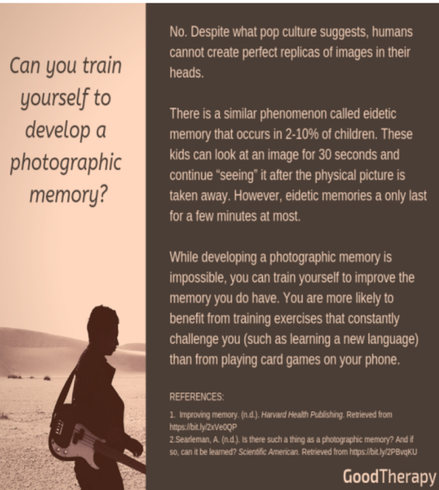Neuroscience behind superpowers
- neuroquest7
- Sep 14, 2024
- 2 min read
Do you know what the brain mechanism behind having photographic memory are?
A photographic memory and a total recall is an ability to recall an image from a picture with high precision at least for a brief period of time after seeing it at once.
People believed to have photographic memory:
Leonardo da Vinci: he could draw a detailed portrait of someone after meeting for a single time.
Wolfgang Amedeus Mozart: he can play an entire piece of music after hearing in one time.
Parts of the brain Involved in memory
The amygdala plays a crucial role in regulating emotions, such as fear and aggression, and is also involved in the storage of memory. Stress hormones influence the amygdala, which is responsible for processing fear memories. For example, a study using Pavlovian conditioning paired a neutral tone with foot shocks in rats, producing a fear memory that caused them to freeze when they heard the tone.
Another study experimented with rats to understand how the hippocampus functions in memory processing. By creating lesions in the hippocampi of rats, researchers found that the rats demonstrated memory impairment in tasks such as object recognition and maze running. This suggests that the hippocampus is involved in normal recognition memory and spatial memory.
A famous case study of a patient known as H.M. found that removing both left and right temporal lobes, including the hippocampus, significantly affected his declarative memory. He was unable to form new semantic knowledge and lost the ability to make new memories, although he could still recall past events before the surgery.
The hippocampus seems to be primarily involved in processing explicit memories, but implicit memories can still be formed even if the hippocampus is damaged. For example, a classical conditioning experiment found that rabbits with damaged cerebellums were unable to learn an eye-blink response to air puffs. Other studies suggest that the prefrontal cortex is also involved in memory processing, particularly in semantic tasks.
Specific neurotransmitters, such as dopamine, serotonin, and glutamate, play a role in the process of memory, although the exact role of each is still debated. Communication among neurons via neurotransmitters is critical for forming new memories, and strong emotions can trigger the release of neurotransmitters and hormones that strengthen memory.










Comments